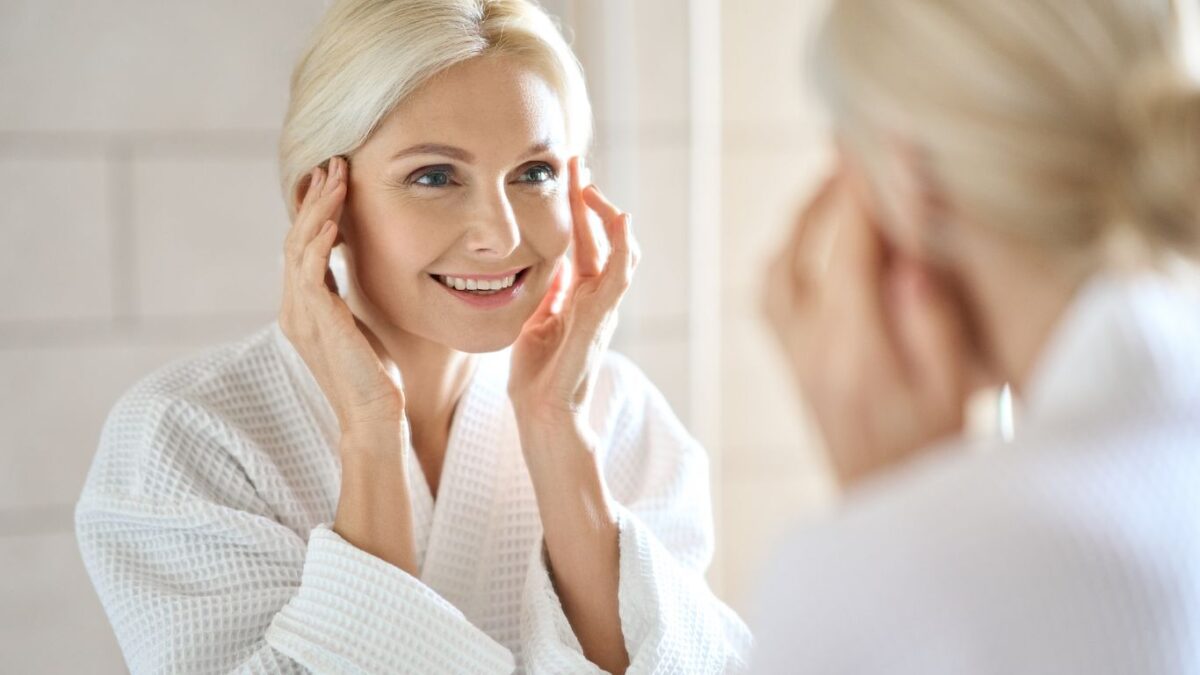Glow On: Skincare Tips for Menopause

While the hormonal shifts of the menopause stage can be challenging, understanding their impact on our skin is pivotal. In this blog, we’ll explore the relationship between skincare and menopause, shedding light on essential practices and products that can help maintain skin vitality. No need for overly technical jargon – just clear insights to support you during this unique chapter of life. Let’s dive into the world of menopausal skincare together.
Understanding Menopausal Skin
During the menopause stage, the body produces fewer estrogens, which can lead to:
Dryness and loss of elasticity
What’s happening?
Estrogen, a primary female sex hormone, plays a key role in maintaining skin moisture and elasticity. As women approach and experience menopause, there’s a noticeable drop in estrogen levels.
Impact on the skin:
This hormonal shift directly affects the skin’s ability to produce oil (sebum) and the protein collagen. Sebum acts as a natural moisturizer, preventing skin from drying out. Meanwhile, collagen is responsible for giving skin its firmness and youthful bounce. As production of both sebum and collagen decrease, the skin becomes drier and loses its plump, firm appearance, making it more susceptible to external stressors and dehydration.
Hot flashes and redness
What’s happening?
Hot flashes are a common symptom of menopause, resulting from the body’s reaction to decreasing estrogen levels. This reaction often leads to a sudden and temporary surge in body temperature.
Impact on the skin:
During a hot flash, blood vessels close to the skin’s surface expand to help cool down the body, causing a noticeable flush or redness, particularly on the face and neck. Though temporary, frequent hot flashes can lead to persistent redness and irritation over time.
Increased sensitivity
What’s happening?
The protective barrier of our skin, often termed as the lipid barrier, weakens with a reduction in estrogen levels.
Impact on the skin:
A compromised barrier means that the skin is less effective in keeping out potential irritants, be it from skincare products or environmental pollutants. Consequently, the skin becomes more reactive, leading to increased sensitivity, irritation, and even the potential for allergic reactions.
Thinning of the skin
What’s happening?
Beyond collagen, estrogen also aids in the production of elastin, another protein that helps skin bounce back after being stretched.
Impact on the skin:
With reduced estrogen levels during menopause, there’s a decline in both collagen and elastin. This causes the skin to become thinner, more fragile, and less resilient to physical and environmental stressors. The thinning skin is also more prone to bruising and damage.
Increase in wrinkles
What’s happening?
The combined effect of decreased collagen production, environmental factors, and natural aging processes accentuate the appearance of wrinkles.
Impact on the skin:
Collagen provides structure and volume, and as its production decreases, the skin loses its firmness. This, combined with years of sun exposure, environmental pollutants, and other external damage, deepens existing wrinkles and promotes the formation of new ones. Regular sun protection and skincare tailored to mature skin can help in mitigating these effects.
Skincare Tips for Menopause
Stay Hydrated Inside and Out: Drinking plenty of water helps, but also invest in a good moisturizer. Look for ingredients like hyaluronic acid, ceramides, and glycerin which lock in moisture.
Gentle Cleansing: Opt for a mild, hydrating cleanser. This will prevent stripping your skin of its natural oils, which are already reduced during menopause.
Incorporate Sun Protection: UV rays contribute significantly to premature aging. Use a broad-spectrum sunscreen daily, even if you’re indoors.
Retinoids are Your Friend: Consider using products with retinoids. They help in boosting collagen production, which can combat wrinkles and improve skin texture.
Antioxidants for the Win: Serums containing Vitamin C, E, and ferulic acid can help combat free radical damage, promoting radiant skin.
Don’t Forget Your Eyes and Neck: These areas can show signs of aging more rapidly during menopause. Invest in a good eye cream and neck cream to address specific concerns.
Gentle Exfoliation: Remove dead skin cells and rejuvenate the skin with mild exfoliants. This encourages cell turnover and boosts radiance.
Hormone Replacement Therapy (HRT): Consult your healthcare provider about HRT. It can alleviate some menopausal symptoms and may have positive effects on the skin.
Lifestyle Changes for Better Skin
Balanced Diet: Ensure your diet is rich in antioxidants, Omega-3 fatty acids, and vitamins. Foods like fish, nuts, berries, and green leafy vegetables can promote healthier skin.
Regular Exercise: Physical activity can boost circulation, giving your face a healthy glow and aiding in skin cell renewal.
Manage Stress: Stress can exacerbate skin issues. Consider relaxation techniques like meditation, yoga, or simply taking time for yourself.
Avoid Smoking and Limit Alcohol: Both can accelerate skin aging and exacerbate dryness.
Seek Professional Advice
There are a plethora of treatments and professional skincare services tailored for menopausal skin, from lasers to facials. Consult a dermatologist to understand which might be suitable for you.
Remember, ladies, menopause is a natural phase of life. With the right care and a dash of self-love, you can navigate through it with grace, confidence, and glowing skin. Embrace this chapter and let your inner beauty shine through! 💫
